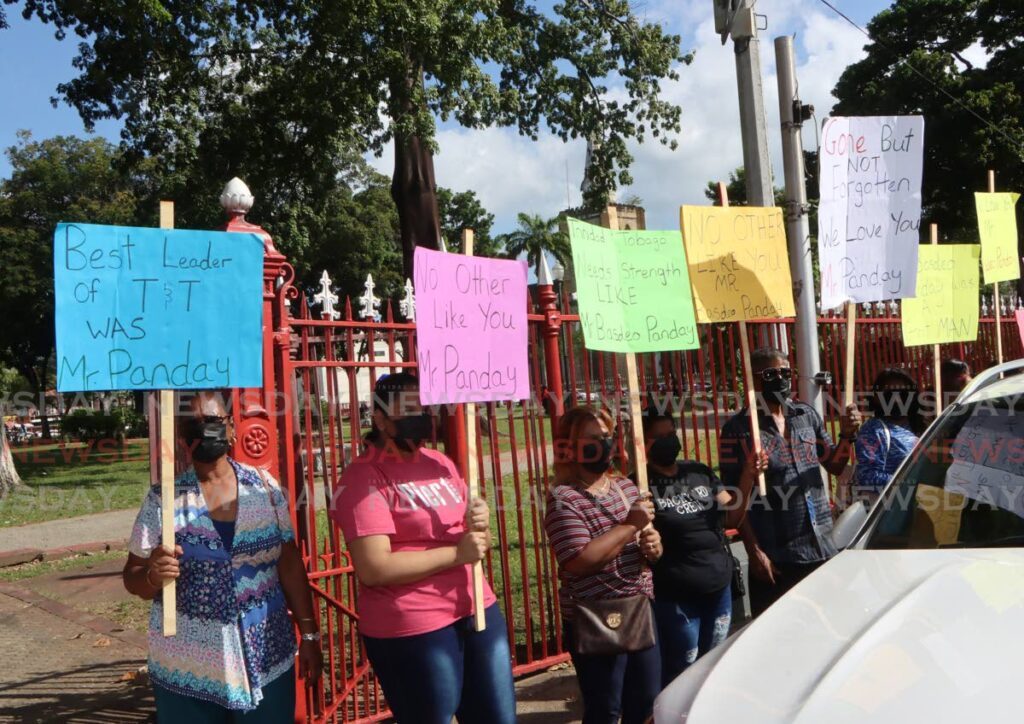Out of labour into politics

HARRY PARTAP
THE overwhelming public support for Basdeo Panday in death matches that of the peak of his popularity as a trade union and political leader in life. Panday was revered by sugar workers to the extent that most of them placed his photograph in their prayer room among the Hindu deities. They draped his photograph with colourful malas (flowered garlands) and illuminated it with a lighted deya. Each morning they performed aarti over it as they did with the deities.
It was an honour not even accorded to Bhadase Sagan Maraj, who had previously been both their trade union and religious leader. When as a journalist, I drew this to Panday’s attention during our many conversations he simply referred me to St Luke’s Gospel chapter 19, verse 40, which stated, “if they were silent even the stones would cry out!” Without any trace of narcissism, he turned to me and added, “but never let it get to your head.”
Panday believed in the power of the people. He was never afraid of that power. Shortly after the death of Maraj in 1971, Panday was invited by All Trinidad Sugar and General Workers’ Trade Union (ATSGWTU) general secretary Rampartap Singh to take-over the leadership of the union. On accepting the invitation, he immediately changed the system of elections in the union by introducing the “one man-one vote” system to replace the “delegate” system. This meant that all bona-fide union members had the opportunity to vote for union officers including that of president-general. He recalled Rampartap Singh warning him that the one man-one vote system was a noose by which the workers will hang him. Panday retorted, “I prefer to be hanged by workers than to hide from them.”
Panday carried this philosophy into the political arena when both the United Labour Front (ULF) and the United National Congress (UNC) were formed. He was critical of political leaders who formed political entities behind closed doors. Referring to the late political activist Ramdeo Sampath-Metha in wit, he said, “My good friend Ramdeo goes into a hotel room with five persons and comes back out with a political party.” You form a political party when the people make a call for it, he would say.
Panday characterised his trade union activities on behalf of workers as a “struggle” making the point that no employer will simply hand workers better pay or working conditions without a fight. Panday used several unorthodox methods in that struggle. Two such methods were the “one week on, one week off” circumvention of strike action; and “free labour”. He made a case for “worker-participation” in management at Caroni Ltd and won the right to have a worker-representative on the company’s board of management.
To sugar workers he was like a messiah who rescued them from low wages and exploitative working conditions. Panday had great faith in sugar workers who were at the low rung of the social ladder. However, by 1996 UWI economist Dr Dhanayshar Mahabir revealed in a study that sugar workers economic conditions had improved four-fold between 1975 and 1996.
Panday was not only concerned about sugar workers but also cane farmers. When Raffique Shah took over the Trinidad Island-wide Cane Farmers’ Association (TICFA) the management of Caroni Ltd refused to meet with him. Panday named Shah an advisor to ATSGWTU bringing him into discussions with Caroni Ltd’s management. The company objected but Panday insisted that Shah remain. After a long stand-off the company relented and Shah was eventually able to meet and treat with them on behalf of TICFA.
Panday remained committed to raise the profile of sugar workers. In 1976, when the ULF became the official opposition, Panday named a cane cutter, Dora Bridgemohan, as one of the six senators. When told that because of the level of her education she may not be able to contribute to the debate in the Upper House, his short response was, “I did not put her there to talk.” He explained, “I put her there to make a statement that even a cane cutter can aspire to the highest office in the country. It was done to motivate our young people, particularly, our young women to aspire to greater heights and to remove the mystery surrounding this thing called, the corridors of power.”
Panday’s charisma dominated the political parties he led and those of us who contested seats won because of him. The political cemetery is filled with those who felt they could have succeeded on their own. I recalled in 1995 while campaigning in the Cumuto area in east Trinidad I approached an aged women asking for her vote. She looked at me suspiciously and said, “Who party you be, son?” Meaning, to which party do you belong. Having said the UNC, she replied, “Panday party, nuh?” “Yes,” I answered. “Good, ah go vote for he!”
That was the level of love, admiration, respect and confidence Panday enjoyed from ordinary people.
Harry Partap was the UNC Nariva MP from 1995-2007; Cumuto/Manzanilla MP from 2007-2010.

Comments
"Out of labour into politics"